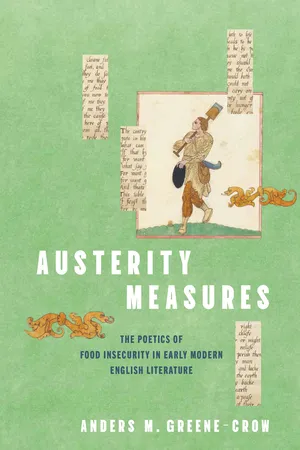
Austerity Measures
The Poetics of Food Insecurity in Early Modern English Literature
- 256 pages
- English
- ePUB (mobile friendly)
- Available on iOS & Android
Austerity Measures
The Poetics of Food Insecurity in Early Modern English Literature
About this book
Explores how early modern writers used poetry to fight food insecurity Austerity Measures explores how early modern writers used poetic form as a tool to fight extreme food insecurity. Authors such as Thomas Tusser, George Herbert, Robert Herrick, Anne Bradstreet, and Thomas Tryon witnessed the privatization of public farmland, rising food prices amidst uncontrolled inflation, mass starvation in nascent North American colonies, and the racist violence of the Caribbean plantation slavery system. Anders M. Greene-Crow shows how these authors experimented with literary form in an effort to change readers' beliefs and behaviors with regard to food ethics.By examining this history, Greene-Crow sheds new light on both modern-day food ethics and activism's place in literary writing. This book traces how authors' solutions to food insecurity turned away from structural models of communal care and toward the now-dominant consumer-capitalist model championing individual dietary choice. Simultaneously, he reveals why literary criticism began to discount literature's power as a tool for social change. The New Critical school, whose close reading methodology dominates literary analysis, arose out of Southern Agrarianism, a movement that sought to return the South to antebellum structures of racial hierarchy and labor exploitation that took shape in the early modern period. These intersectional labor politics underlie close reading, continuing to limit critics' understanding of how literary form produces social change, and reinforcing the scarcity culture of literature departments today.By recovering poetry's role as a force for affecting readers' relationship to one of their most basic needs—the need to eat— Austerity Measures develops an alternative methodology that takes writers' material conditions into account in analyzing form.
Frequently asked questions
- Essential is ideal for learners and professionals who enjoy exploring a wide range of subjects. Access the Essential Library with 800,000+ trusted titles and best-sellers across business, personal growth, and the humanities. Includes unlimited reading time and Standard Read Aloud voice.
- Complete: Perfect for advanced learners and researchers needing full, unrestricted access. Unlock 1.4M+ books across hundreds of subjects, including academic and specialized titles. The Complete Plan also includes advanced features like Premium Read Aloud and Research Assistant.
Please note we cannot support devices running on iOS 13 and Android 7 or earlier. Learn more about using the app.
Information
Table of contents
- Cover
- Title Page
- Copyright
- Dedication
- Contents
- Introduction. Starving Writers: A Food History of Literary Form and Criticism
- Chapter 1. Verse Form for Thriftier Farms: Thomas Tusser’s Agrarian-Economic Poetics and Its Afterlives
- Chapter 2. Food Restriction at the Community Table: Making Hunger Palatable in George Herbert’s and Robert Herrick’s Poetics of Dietary Ethics
- Chapter 3. Aestheticizing Food Insecurity in Anne Bradstreet’s Poetics of Meanness
- Chapter 4. Clean Eating: Recipe Form as a Tool for Internalizing Food Ethics in Thomas Tryon’s Writing
- Epilogue. The Agrarian History of Close Reading and the Future of Academic Labor
- Notes
- Index
- Acknowledgments